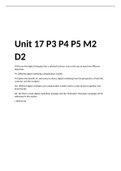Other
BTEC Covers unit 17 digital marketing p3,p4,p5,m2, d2
- Module
- Unit 17 - Digital Marketing
- Institution
- PEARSON (PEARSON)
This piece of work covers all of the criteria for Unit 17 p1 p3,p4,p5,m2, d2. I have achieved a distinction in this unit by Pearson Edexcel in aug 2022. I hope this helps!
[Show more]



